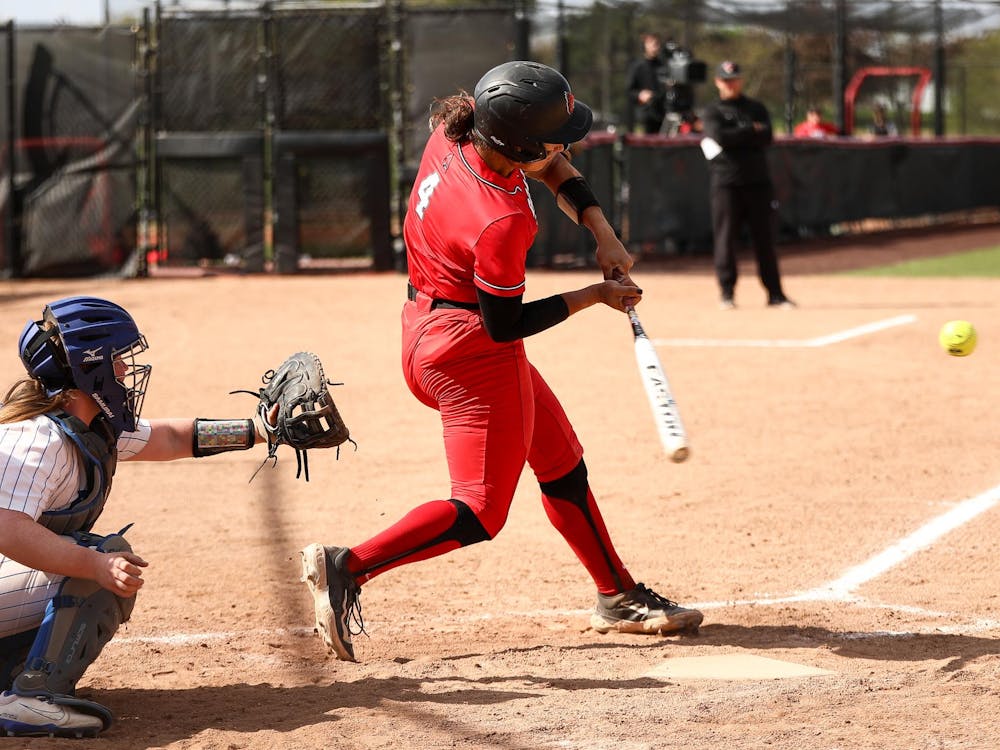How the internet outage affected local organizations around Ball State
The Cup:
Martin George, owner of The Cup, said in a phone call the morning of Feb. 10 that he didn’t notice an increase in customers when the Wi-Fi on campus was down. He said The Cup is usually busy during the day.
Brothers Bar & Grill:
Autumn Wright, an employee at Brothers Bar and Grill, said her 10 p.m.-4 a.m. shift saw the usual number of customers in a phone call 11 a.m. Feb. 10.
UPD:
Ball State Director of Public Safety Jim Duckham said the internet outage had no effect on the University Police Department’s ability to respond to calls and conduct usual operations.
Ball State Dining:
Karen Adkins, senior director of auxiliary services, said the internet outage didn’t affect meal swipes and that dining halls were still able to process meal payments normally.
Christian Campus House:
Mark Pike, pastor at the Ball State Christian Campus House, said there were students working on assignments at the church but not an unusual amount. They also experienced slow internet around 3 p.m. Wednesday, but never a shortage.
Source: The Cup, Brothers Bar & Grill, UPD, Ball State Dining, Christian Campus House
Fourteen hours after campus internet came back from a nearly six-hour outage Feb. 9 — with no more than two tweets communicated from the university — the Ball State community was finally given an explanation to what happened.
Ball State tweeted at about 2:10 p.m. that staff was looking into the internet outage and had no further update on the time of internet restoration. The university tweeted again at 7:45 p.m. that internet access was restored without additional information about the cause of the outage.
It wasn’t until 9:40 a.m. the following morning, Wednesday, Feb. 10, that Loren Malm, vice president for information technology and chief information officer, said the outage was purposeful to protect from a potential security threat.
In an email sent to the entire university, Malm said the university’s technology security infrastructure alerted university officials that there was a potential intrusion, which prompted university officials to shut down the campus-wide internet in an attempt to block the intrusion.
English professor Molly Ferguson said in an email she had no idea there was an internet outage until no one in her 2 p.m. in-person class could log on to do their work. Ferguson said she did not receive any guidance from the university on how to conduct her class.
“I would have liked to be informed that it was going to be a while before the internet came back, so I didn’t just keep trying over and over,” Ferguson said.
Clare Sexton, sophomore fashion merchandising major, was in Bracken Library to meet her Alpha Gamma Delta sorority sisters to give them Bid Day T-shirts when the internet went out.
“I can’t text anyone to tell them that I’m here or update my spreadsheet, so I’m just praying that people know that I’m here,” she said at the time. “I’m kind of just sitting here hoping people come get their shirts.”
Sexton said in an email the following morning that only three people picked up their shirts while she was in the library, but she planned to meet her sorority sisters throughout the rest of the week so everyone else had the opportunity to pick up their shirts before Feb. 14.
Sexton said she began working on assignments again when she returned to her dorm room. She added that none of her professors addressed the Wi-Fi outage or due dates for this week.
Andy Hoffman, senior political science major, was also in Bracken Library working on homework when the internet went out.
“I usually like to come here and study,” he said. “I don’t really like doing work in my apartment because I feel like I’ve been in my apartment too much because of coronavirus.”
Hoffman commuted to campus from the Haven to work on a math assignment and short essay both due that night. Hoffman said he tried to look at the bus app, but with the internet out, it took “forever to load.”
“This is nobody’s fault,” Hoffman said. “Technological problems just happen, but it really can affect people if the library’s not properly functioning because it’s just easier to study here.”
When the internet stalled, Kara Nahrwold, sophomore social studies education and general history double major, was in her Studebaker West dorm room getting ready to walk to the Letterman Lobby before her 3:30 p.m. history class.
“For this class, some kids Zoom in,” she said in an email the following morning. “My history class was different to say the least. My professor was not able to pull up the PowerPoint he created because it crashed. He fiddled with his computer for a good 15 minutes. Those who Zoom were unable to join the class and just assumed that it was canceled.”
Nahrwold said she couldn’t complete any assignments while the internet was out, including a paper that was due at 9 a.m. the morning of Feb. 11. While waiting for the internet to return, her history club played the word-guessing game “Hangman” for an hour at its 6 p.m. meeting.
“I am disappointed and angry that the university did nothing to let the students, or even the faculty for that matter, know what was going on or give an estimated time that the Wi-Fi would be back on,” Nahrwold said. “The least the university could have done is email us after it was over to let everyone know what happened and why it happened.”
Computer science professor Dave Largent said he saw students replying to Ball State's initial tweet about the internet outage and began replying to try to help students with class assignments.
“I do not know the reason for the outage, but my strong suspicion is that it was totally out of Ball State’s control,” Largent said in an email.
Largent said he noticed many students were trying to access Canvas via my.bsu.edu, which was down for all students during the on-campus internet outage.
Largent began replying to students under Ball State’s tweet with a link to the Canvas website for them to still access their assignments if they used a hotspot. He said he noticed there were a lot of people who clicked on the link he provided on Twitter.
Largent also mentioned he did not adjust any of the deadlines for assignments in his classes because the next assignments’ due dates were Wednesday afternoon and night. He sent a message to his students providing them with a link to Canvas if they were able to access the internet.
Regarding guidance given to faculty on adjusting deadlines for the outage, Kathy Wolf, vice president for marketing and communications, said in an email at 7 p.m. Feb. 10 that the university’s faculty “have the flexibility to make adjustments as they deem necessary when unexpected events occur.”
“I mentioned that using their cell phone as a hotspot might be an option,” Largent said. “I also offered to provide direct URLs to other BSU services, if they needed them. I did not receive any requests.”
Largent said he wishes the university had provided students and staff with a status report in the middle of the outage, even if it was just that it was working to resolve the issue. Though he did not think the university failed to meet the needs of students, he felt he was filling a void left by their lack of response during the outage.
Malm sent an email on Feb. 10 asking students, faculty and staff to change their mybsu passwords as a precautionary measure, stating that all users will be required to change their password in the next 48 hours.
“After a thorough review, we have no evidence that any personally identifiable information was compromised,” Malm said in the email. “We are continuing to work with internal and external experts to evaluate that our preliminary assessment of the situation is accurate.”
English professor Cathy Day said she didn’t hear from the university about the internet outage until she received the email asking her to change her password.
“I had no idea about the internet outage until I woke up this morning and saw my colleagues talking about it on social media,” Day said via email.
Day said she teaches an online asynchronous class and didn’t have any assignments due yesterday, so she didn’t have to deal with any situations related to the outage. She added that she did not receive any messages from students about the outage that night.
“It probably would have been good to use the university’s crisis communication system to let people know that this was happening,” Day said, “but if we didn’t have internet, how do we use this system?”
Contact Maya Wilkins with comments at mrwilkins@bsu.edu or on Twitter @mayawilkinss. Contact Grace McCormick with comments at grmccormick@bsu.edu or on Twitter @graceMc564.





